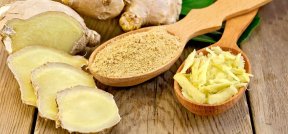
Give your pantry and fridge a quick scan. Do you see powdered or fresh ginger? If not, it’s time to plan a trip to the grocery store—stat! That’s because this medicinal marvel, long touted in Chinese medicine and Ayurveda as a healing spice, actually has a significant amount of science to back it up. And it isn’t just motion sickness that it treats. Ginger can also knock out PMS pain, headaches, bloating, and so much more. Here are some compelling reasons to start embracing this potent, flavor-packed root on the regular.
It Soothes Sore Muscles
Hit the ginger before you hit the gym. Research has found that ginger, which acts as a natural pain reliever and anti-inflammatory, can ease post-workout muscle soreness. In a study published in The Journal of Pain, participants who took two grams of ginger a day (1 tablespoon fresh grated ginger, or 3/4 teaspoon powdered ginger) experienced a 25% reduction in exercise-induced muscle pain 24 hours after a workout compared to a placebo. Runners can also benefit: In another study, endurance athletes who took powdered ginger (like you’d find in your spice cabinet) had lower markers of inflammation.

It Banishes Stomach Bloat
You know ginger as a nausea fighter, but that’s not its only stomach perk: “Ginger gets your digestion going and can keep your belly from uncomfortable or embarrassing bloating,” says Capalino. Known as a carminative herb (meaning it gets rid of excess gas), compounds in ginger stimulate gastric juices and digestive organs to boost digestion. Plus, it contains the enzyme zingibain to help break down proteins.
It May Preserve Your Memory
Ginger may buffer your brain against Alzheimer’s. The neurodegenerative disease is linked to sticky deposits of amyloid proteins in the brain, yet a laboratory study suggests ginger may protect brain cells from these plaques, delaying the onset and progression of the disease. The effects have yet to be studied on humans, but because eating ginger is pretty much risk-free, it’s worth incorporating into a brain-healthy diet.











